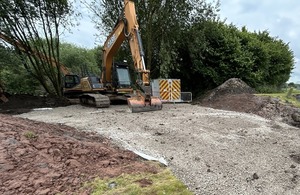Work starts on flood embankment near Raynesway, Derby
The Environment Agency has started flood embankment work in the Raynesway area of Derby following on from the impacts of winter 2023/24.

- Erosion caused by last winter’s extreme flows on River Derwent
- Work to be completed as soon as possible
- Teams working to minimise disruption to local cricket club
Following the extreme flows in the River Derwent last winter, investment is needed to maintain a flood embankment which has suffered from erosion.
These works are part of a programme of flood recovery works following on from the impacts of last winter.
The flood embankment extends from the A5111 (Raynesway) northwest to where the Midlands Mainline railway crosses the River Derwent and provides flood protection to the Raynesway area.
Teams started work earlier this month and are liaising closely with the organisations affected.
Gretchen Moeser, Operations Manager for the East Midlands Environment Agency, said:
“It is vital that these works are carried out as soon as possible ahead of this winter to ensure flood protection to the Raynesway area is maintained.
“Access with plant and machinery will be required around the perimeter of the adjacent cricket ground to carry out the necessary repairs to the flood embankment.
“We recognise that this will have an unavoidable impact on use of the cricket ground over the summer months and that there may be some disruption to planned fixtures as a result.
“The project team will work with the cricket club to minimise disruption wherever possible, but it is anticipated that 7-day working will be required to complete the works by October.
“We apologise for any inconvenience caused by these works and thank you in advance for your support whilst these urgent repairs to the flood embankment are carried out.
“We will be watching river levels very closely in this area and have contingency measures that will be put in place should there be adverse weather forecast.
“If people have concerns around flooding they should call our 24/7 hotline on 0800 807060.”